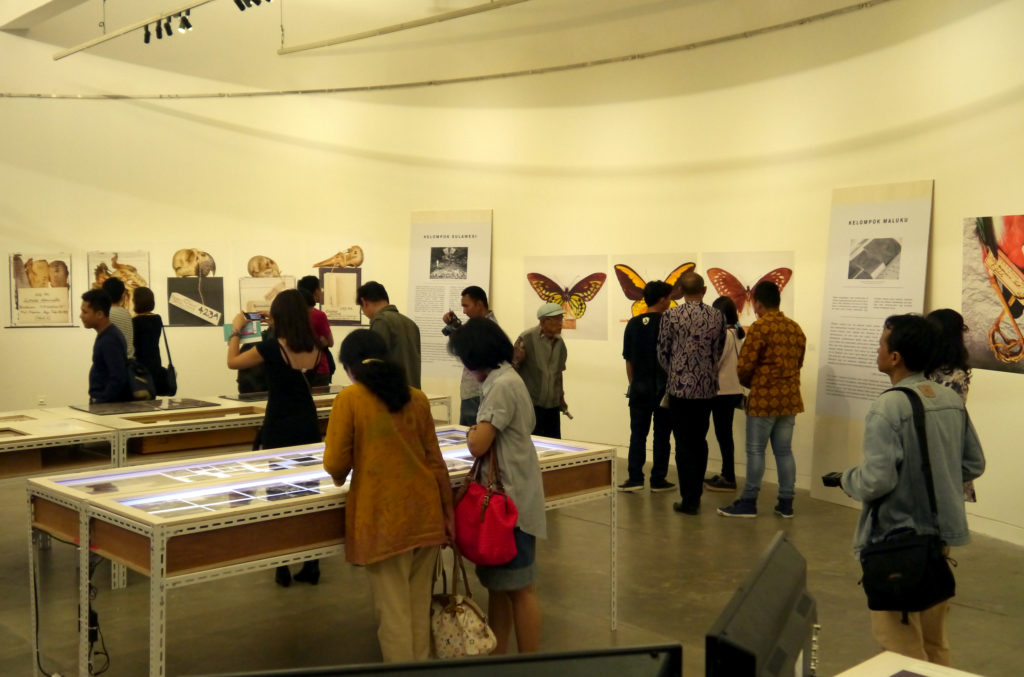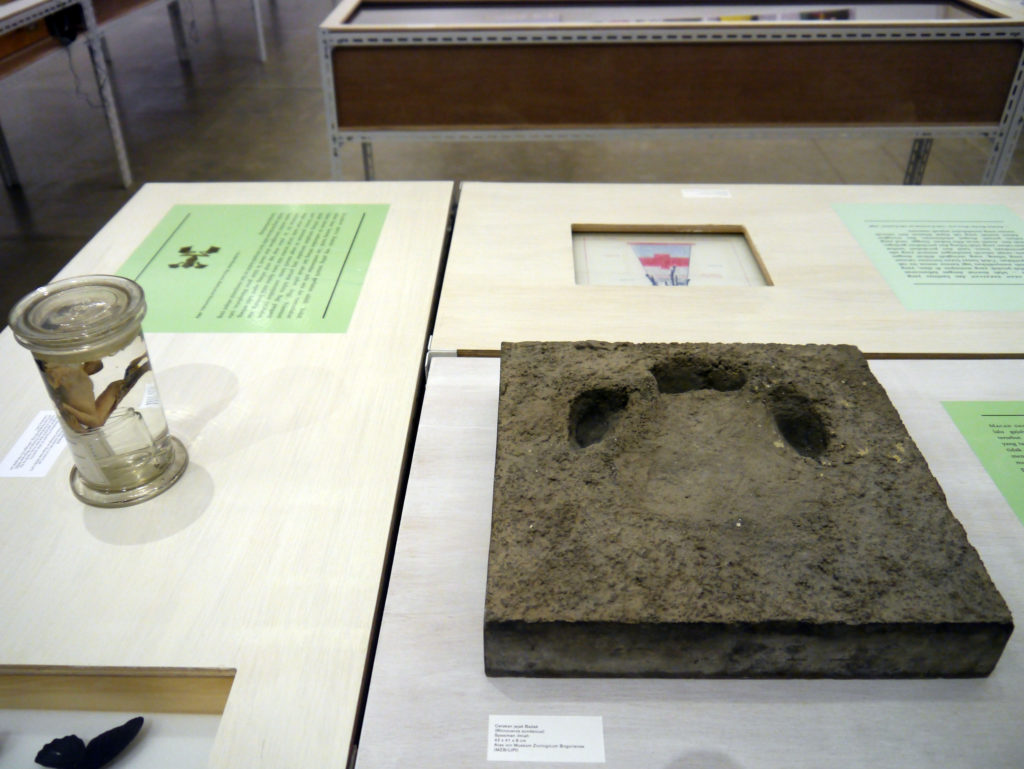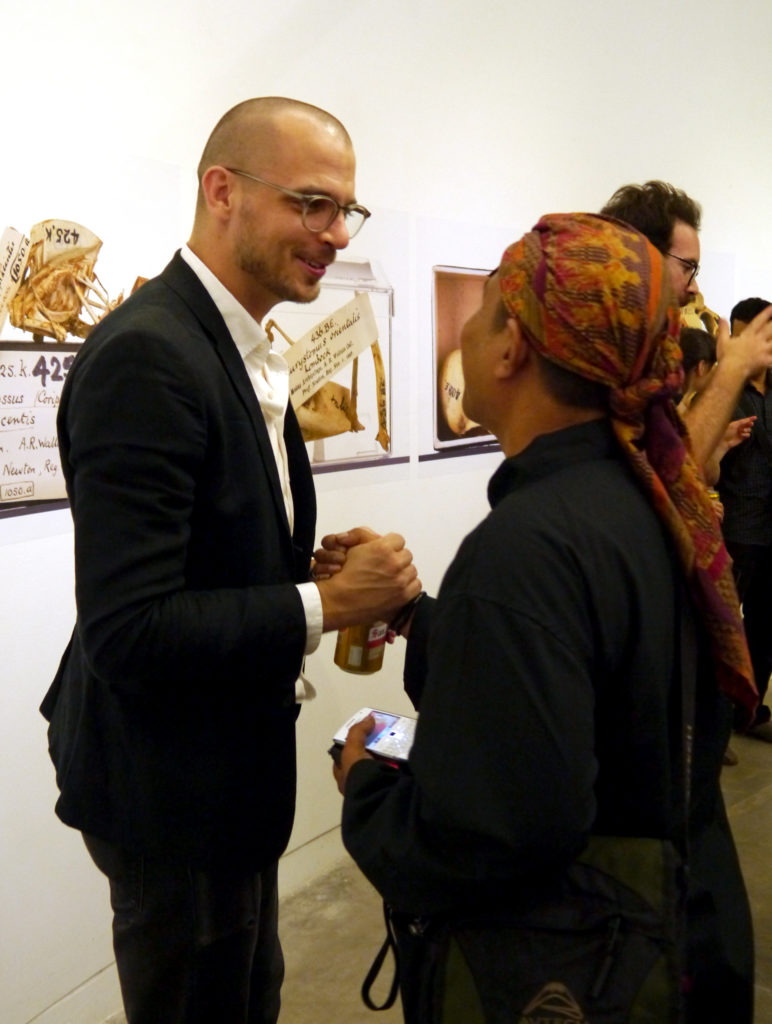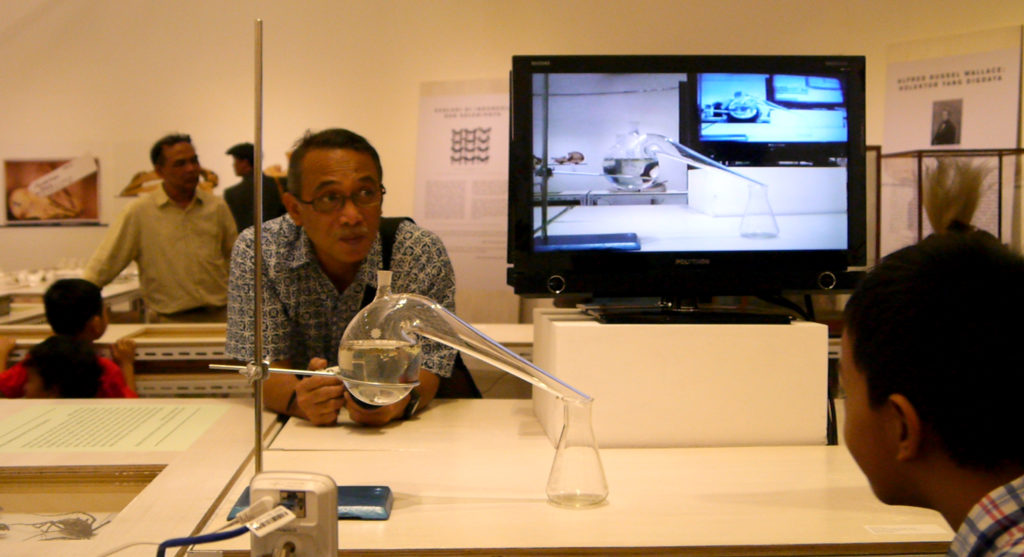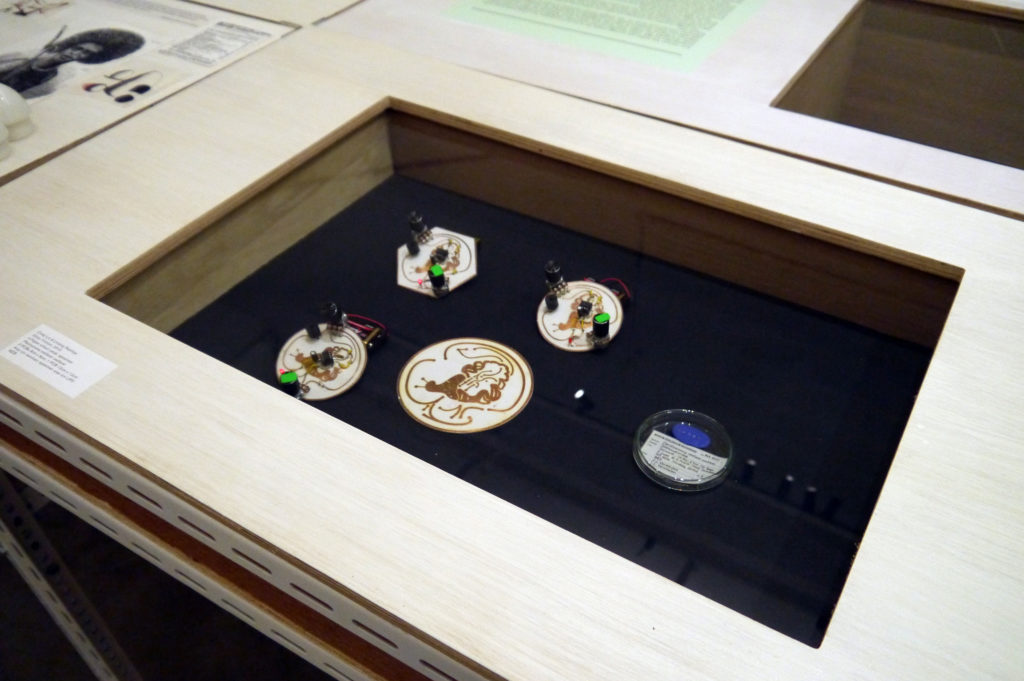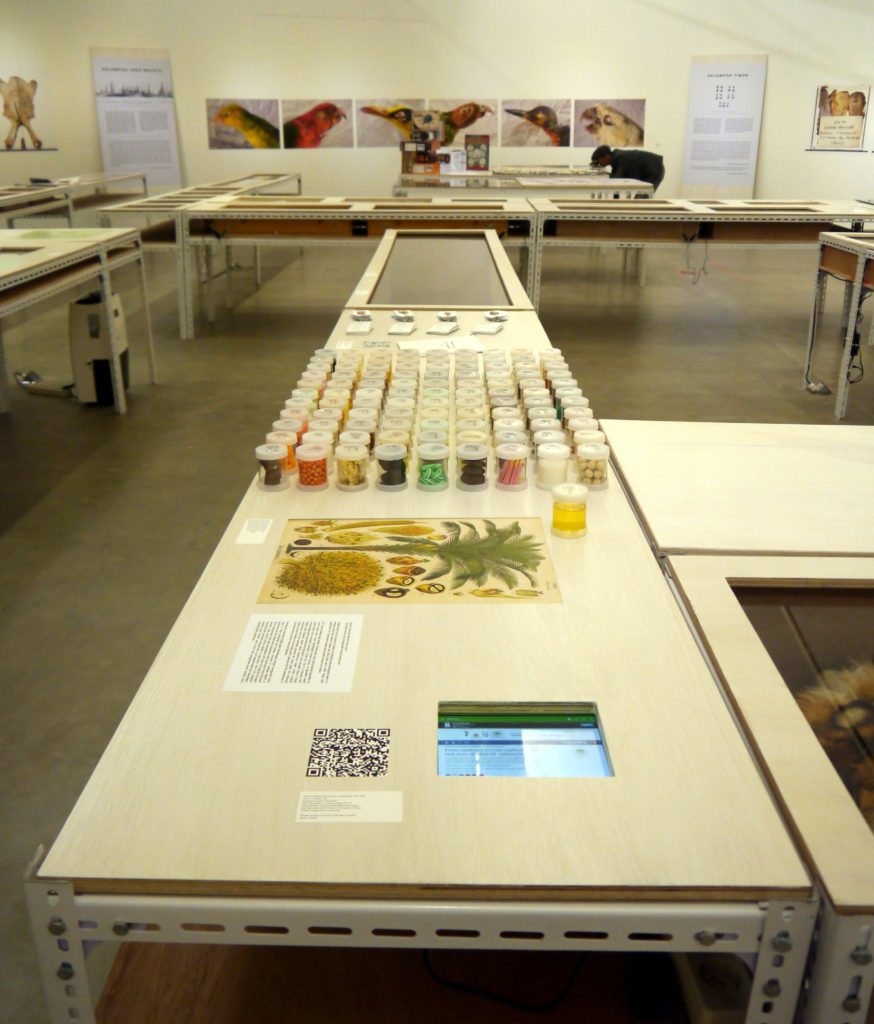125,660 Specimens of Natural History
125.660 Spesimen Sejarah Alam
Komunitas Salihara Gallery
Jl. Salihara No. 16 Jakarta Selatan
16 August – 15 September 2015
125,660 Specimens of Natural History is the first major exhibition of Reassembling the Natural; the project addresses colonial natural history collections and the environmental transformations they produced, and the legacy of these activities, known as the Anthropocene. The exhibition follows the course of Alfred Russel Wallace (1823–1913), best known for co-discovering the theory of evolution by natural selection. From 1854 to 1862, Wallace travelled the Malay Archipelago, documenting the region’s biodiversity and amassing a gigantic collection of specimens for European museums. The project invites artists to retrace, re-appropriate or reassess the expedition, its documents, and its various artifacts, and explores how trans-cultural collaborative approaches to artistic and scientific practice can address urgent environmental questions.
Premiering at the gallery of the multi-arts center Komunitas Salihara, the project presents works by 13 Indonesian participants and 13 foreign participants—including ten newly created artworks—alongside books, archival material, and zoological specimens from the Research Center for Biology/Indonesian Institute of Sciences (MZB/LIPI) at Bogor-Cibinong, and related historical objects.
The exhibition also hosts a weekly program aimed at a general public that brings together Indonesian and international artists, environmentalists, and natural scientists.
An exhibition catalog (access PDF) in Bahasa Indonesian, edited by Springer and Turpin, is available for free as part of the show; besides texts on each participating artist and their work, the publication includes a series color photographs by participating artist Fred Langford Edwards as well as images from the curatorial research process; a fold-out poster, and an essay and a timeline on A.R. Wallace’s Malay expedition by evolutionary biologist Andrew Berry (Harvard University) translated from English by Ninus D. Andarnuswari.
Read and see more about the exhibition and its research process in Springer & Turpin’s photo essay “Vestiges of 125,660 Specimens of Natural History” in Stedelijk Studies No. 4 “Between the Discursive and the Immersive” (2016).
The exhibition 125.660 Spesimen Sejarah Alam is realized in partnership with the multi-arts center Komunitas Salihara and with zoological specimens loaned from the Museum Zoologicum Bogoriense/Indonesian Institute of Science (LIPI/MZB). It was made possible by Schering Stiftung and with additional support of the Goethe-Institut and the British Council.
Exhibition Colophon
Indonesian Participants
- Ari Bayuaji
- farid rakun (Equanorth)
- Theo Frids Hutabarat
- Aprina Murwanti & Bharoto Yekti
- Intan Prisanti
- Lintang Radittya
- Ary Sendy
- Andreas Siagian
- Zenzi Suhadi (WALHI)
- Satrio Wicaksono (Towuti Drilling Project)
- Tintin Wulia
- Mahardika Yudha
International Participants
- Fred Langford Edwards
- Lucy Davis
- Mark Dion
- Sigrid Espelien (Equanorth)
- Geraldine Juárez
- Cindy Lin
- Edwin Scholes & Tim Laman
- Flora Lichtman & Sharon Shattuck
- Shannon Lee Castleman
- Laleh Torabi
- Robert Zhao Renhui (Institute of Critical Zoologists)
Reassembling the Natural Curatorial Team
- Anna-Sophie Springer, Curator & Research
- Etienne Turpin, Curator & Research
- Sonja Dahl, Exhibition Coordinator
- Alexandra Berceanu, Graphic Design Exhibition & Publication
- Alifa Rachmadia Putri, Curatorial Assistant
- Tatyana Kusumo, Exhibition Design Assistant
- Widya Ramadhani, Production Assistant
- Robin Hartanto, Production Assistant
Exhibitions Team at Komunitas Salihara Jakarta
- Dian Ina Mahendra, Komunitas Salihara Gallery Manager
- Asikin Hasan, Komunitas Salihara Curator of Contemporary Art
- Nirwan Dewanto, Komunitas Salihara Program Director
Scientific Research Partners
- Pusat Penelitian Biologi
- Lembaga Ilmu Pengetahuan Indonesia (MZB/LIPI), Cibinong
Scientific Curatorial Team at the Indonesian Institute of Science
- Prof. Dr. Rosichon Ubaidillah, M.Phil., Head of Zoology, Museum Zoologicum Bogoriense
- Dr. Awit Suwito, Kepala Sub-seksi Manajemen Koleksi
- Dr. Amir Hamidy, Kurator Herpetofauna
- Ir. Maharadatunkamsi, M.Sc., Kurator Mammalia
- Dr. Djunijati Peggie, M.Sc., Kurator Serangga
- Mohammad Irham, M.Sc., Kurator Burung
Researched Collections
- Lembaga Ilmu Pengetahuan Indonesia (LIPI, Bogor, Indonesia)
- Museum Zoologicum Bogoriense (MZB, Bogort, Indonesia)
- Perpustakaan Nasional Indonesia (Jakarta, Indonesia)
- Linnean Society (London, UK)
- Natural History Museum (London, UK)
- Tring Natural History Museum (Tring, UK)
- Oxford Natural History Museum (Oxford, UK)
Reassembling the Natural thanks Dian Ina Mahendra, all artists, scientists, and contributors, as well as all the entire staff of Komunitas Salihara.
The curators would also like to thank:
Lauren Allen, Bergit Arends, Franz Xaver Augustin, Angeline Basuki, Dr. Annette Bhagwati, Dr. George Beccaloni, Prof. Dr. Andrew Berry, Dr. Heinrich Blömeke, Lynda Brooks, Irma Chantily, Elaine Charwat, Yantri Dewi, Nirwan Dewanto, Errol Fuller, Prof. Dr. Matthias Glaubrecht, Anita Nermannstädter, Sam Hodgson, Tomas Holderness, Dr. Darren Mann, Dr. Charles Leh, Jeffrey T. Malecki, Erik Meijaard, Heike Catherina Mertens, Uwe Moldrzyk, Ening Nurjanah, Ho Tzu Nyen, Richard Pell, Jeffrey Petersen, Dr. Robert Prys-Jones, farid rakun, Felix Sattler, Anthony Sebastian, Katrin Sohns, Charles Stankievech, Dr. Renate Sternagel, Fitria Sudirman, Jolyon Sutcliffe, Dr. Pim Westerkamp, Matthew Young, LIPI/MZB, SYNAPSE International Curators’ Network, the Australian Centre for Cultural Environmental Research at the University of Wollongong, and—last but not least—their entire, incredible production team!
The exhibition 125.660 Spesimen Sejarah Alam is realized in partnership with the multi-arts center Komunitas Salihara and with zoological specimens loaned from the Museum Zoologicum Bogoriense/Indonesian Institute of Science (LIPI/MZB). It was made possible by Schering Stiftung and with additional support of the Goethe-Institut and the British Council.






